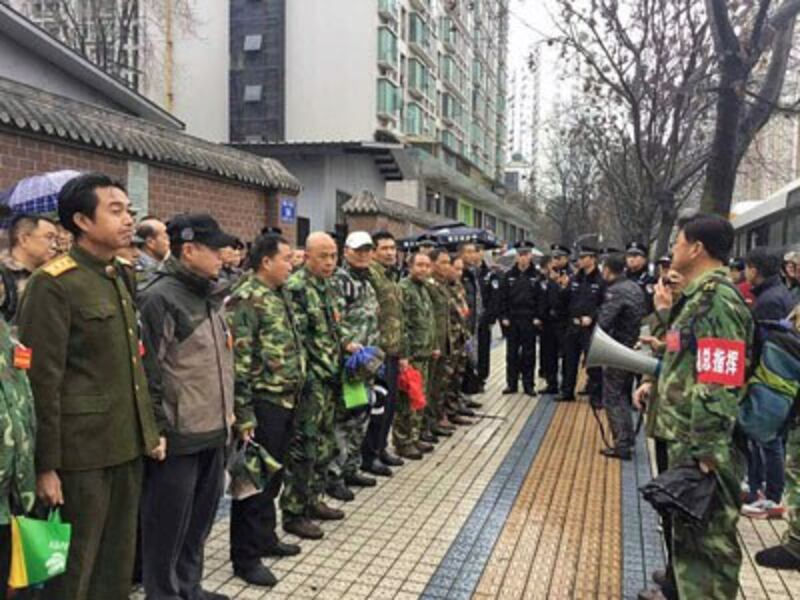Thousands of People's Liberation Army (PLA) veterans protested outside the disciplinary arm of the ruling Chinese Communist Party in Beijing on Wednesday over pensions, healthcare and other demobilization benefits they said were promised but not delivered.
Wearing their uniforms from units and division across the PLA's three services, the veterans lined the streets outside the Central Commission for Discipline Inspection (CCDI), calling on President Xi Jinping to address their grievances.
"We have suffered injustice for our country for the past 20 or 30 years," a veteran protester in uniform addressed the protesters, who were drawn up in ranks as if on parade, according to video footage of the protests seen by RFA.
"Because of [an] illegal regulation, we have been left in poverty and hardship," he told the crowd. "We have no jobs, no income, no status and nowhere to live."
"We are non-people, and now we are being targeted for stability maintenance," he said.
"We are the tragedy of the People's Republic, and a shameful entry in its history," he said.
Outside the CCDI
The protesters also shouted slogans and sang military songs, watched by ranks of uniformed police officers who appeared not to be trying to disperse the crowd.
"Look at them," a protester filming the demonstration says on camera. "The place is packed with people, so many of them ... We are outside the CCDI."
The demonstration is the largest in the Chinese capital since a mass demonstration on Oct. 11 shocked the authorities, who ordered provincial chiefs to Beijing to begin escorting the disgruntled protesters home.
The October protests outside the party's military arm also highlighted a failure to deliver promised pension, medical and social security benefits to demobilized PLA soldiers, regarded by Beijing as one of the country's most politically sensitive groups.
While officials from the Central Military Commission (CMC) ordered provincial and city leaders to Beijing to address the crisis, the veterans say promises that changes would begin to be implemented from Jan. 1 had not been kept.
A veteran surnamed Jiang said that four months on, local officials, far from trying to help the veterans, have done everything in their power to prevent another protest in Beijing.
"Not one person in local government has approached us to resolve these issues," Jiang said. "The online petitioning system is set up to mess people around and fool them that something is happening."
"Our demands still haven't been met," he said.
Jiang said that repeated petitioning trips to Beijing had resulted in more detentions by police, in spite of there being a strong legal basis for their claims.
Clause 3 of the Military Pensions Priority Regulations requires governments to ensure that the standard of living and social situation of demobilized PLA soldiers doesn't fall below the average.
"The standard of living of veterans shouldn't dip below that of the locality where they live," Jiang said.
He said the veterans are protesting at the continuing failure to implement national policy at a local level.

Looking for a ‘ringleader’
Not all veterans made it as far as Beijing, however.
Officers manning a checkpoint at Liulihe on the outskirts of Beijing beat up four veterans from the eastern province of Shandong, one of whom received treatment in hospital for head injuries, after stopping them from entering the capital early on Wednesday morning, veterans told RFA.
The group was stopped by regular police and members of the People's Armed Police and prevented from going any further, sources said.
Another group of veterans from the northern mining city of Taiyuan, Shanxi province, were detained in the Aiminjie No. 39 military hospital, while veterans from Datong and Luliang were detained at a local police station.
Police were keen to find a "ringleader" for the protests, but veterans insisted that there was no top-down leadership, sources said.
On Tuesday, more than 150 veterans from the northeastern province of Heilongjiang were stopped by police en route to Beijing, and taken to the complaints office in the provincial capital Harbin, protesters said.
"They've brought us all here to the Harbin complaints office in three big buses," a protester said from the scene.
A veteran surnamed Zhou said he expects the Beijing protests to continue until China's annual parliamentary session in early March.
And a veteran from the southwestern province of Sichuan surnamed Huang said a group of veterans had also gathered outside government offices in the provincial capital Chengdu on Wednesday.
"At the Sichuan protests, a lot of the veterans were given jobs on demobilization in [state-owned] companies but lost them again when they were laid off," Huang said.
"Those given redundancy payments included platoon and company commanders and deputy commanders, battalion-ranking cadres," he said.
Massive cordon around Beijing
Authorities in Beijing have thrown a massive security cordon around the capital ahead of the annual meetings of the National People's Congress (NPC) and its advisory body starting on March 3, rights activists told RFA.
Hangzhou-based rights activist Zou Wei said police had called him and asked to take him on a forced 'vacation' out of town ahead of the meetings.
"This is definitely linked to the parliamentary sessions," Zou said. "They will let me come back again when they are over."
He said petitioner Liang Liwan is now incommunicado after she refused to sign a pledge not to lodge complaints or petitions during the parliamentary sessions.
"Petitioners and people lodging complaints are a big headache for the authorities," Zou said. "Now, the police have come up with these letters that are basically designed to stop you from petitioning."
Fellow petitioner Fan Yonggen said the letters are part of a nationwide "stability maintenance" system designed to limit or prevent public expressions of discontent.
Reported by Qiao Long for RFA's Mandarin Service, and by Wong Lok-to for the Cantonese Service. Translated and edited by Luisetta Mudie.
